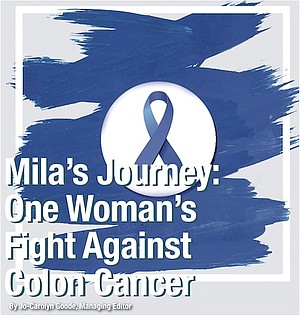3/31/2017

“This has got to be a joke,” thought Jamila Barefield. Yes, a very crude and ill joke that someone was playing on her. But there were no lights, no cameras, or studio audience. It was just her lying in a bed surrounded by four blank walls with tubes everywhere staring blankly in the face of a doctor. And in a very cold, disconnected matter, the doctor parted his lips and utter three horrific words, “You have cancer.”Then the doctor turned and walked away while Jamila was left alone with her thoughts.
That is how Jamila’s world was flipped on its head in 2014. As she sat and pondered how she could have colon cancer she thought about the last few months before this day. Her colon was just recently examined at the end of 2013. Her colon appeared so well that the doctor only examined half her colon. She was sent home with some antibiotics for a small problem she was having. That doctor’s mistake was a contributor to how Jamila ended up where she is today. If that doctor would have completed Jamila’s entire colon examine he would have seen the tumors, which were still small at that time making the colon cancer very treatable. But he missed it.
Still, in pain Jamila goes to another doctor who tells her that her appendix is about to burst and she needs immediate surgery. It is during that surgery that doctors see why her appendix is inflamed. It is being pushed upon by a tumor. She had stage IV colon cancer and only had a 10% chance to live at just 36-years-old.
Jamila is not alone in her fight. Colon cancer patients are getting younger and younger. The stigma to age is the problem. If you look at most health checklist the age that you are advice to start colorectal cancer screenings is at 50. Hence why a lot of doctors think of it as an older person's disease and rarely screen younger adults for it. But there are people as young as 17 years of age with colon cancer. Studies indicate that over 13,000 new cases of colon cancer will be diagnosed in people under 50 this year. Doctors are examining now whether to revised guidelines because of this growing problem.
So what exactly is colon cancer? Cancer, in general, is one of the top five leading causes of death in women. The American Cancer Society defines colon cancer as cancer that starts in the colon or the rectum. Cancer starts when cells in the body begin to grow out of control. Cells in nearly any part of the body can become cancer and can spread to other areas of the body. Most colorectal cancers begin as a growth called a polyp on the inner lining of the colon or rectum. Some types of polyps can change into cancer over the course of several years, but not all polyps become cancer. The chance of changing into cancer depends on the kind of polyp.
During Jamila surgery where doctors discovered she had cancer, they removed the cancerous polyps and started her on chemotherapy. Like a soldier, she went through 12 rounds of chemotherapy.
Wanting more answers to her questions she sought out the best. She found it at Mercy Hospital in Baltimore. It was while there that she found out her cancer has started to spread and had reached her peritoneal wall. This she tried a special type of chemotherapy called Hyperthermic intraperitoneal chemotherapy (HIPEC). Hot chemotherapy was placed in the abdomen for 90 minutes then washed and drained out. HIPEC would reach the areas regular chemo couldn’t. Jamila would then undergo another surgery to remove her ovaries, gall bladder, and omentum. Followed by another four rounds of chemo. Her last chemo treatment was December 2014.
Before you cheer for Jamila, there was another problem. Out of nowhere, she starts seizing. All her husband could do was hold her and make sure she didn’t injure herself. Come to find it was the result of another doctor error. One doctor didn’t get her one of her needed medications and then overdose her when he realized it. A behaviorist had to detox her the drug which some say is worst than coming off heroin.
All that was worth it for Jamila to hear words she never thought she would hear. “You are cancer free.” She actually heard those words while at M. D. Anderson in April 2015. But then came the “but.” There was a spot that alarmed doctors that they would keep watch over.
So every two months Jamila religious came for her scan. Each time the spot got just slightly larger until doctor realized it was a tumor hiding behind scar tissue. Jamila’s cancer was back and had spread. This time chemo was not an option. No drug was. The doctors told her that they have done all that they could do and she should go into hospice.
That was 2015. It is 2017 and Jamila is still kicking. Thanks to God and her strong faith. “I have definitely leaned on him for strength for all of it,” said Jamila. “I have a closer relationship with Him from the begging of this to now.” Jamila also has a strong support system. Riding out this battle with her at every step is her loving husband Brian (who is also our avid sports writer), her four children, her mother (who is a colon cancer survivor) and a host of others.
Jamila baffles her doctors and nurses who counted her out years ago. But she keeps beating the odds. She admits that it is a hard fight but you have to keep pushing. “When you stop pushing is when cancer wins.” Today, she keeps busy as the co-host of the 2 Sports Dummies radio show she does with her husband and as the founder of Mila Journey Foundation that helps other young adults with colon cancer.
March is National Colon Cancer month. Do yourself a favor and learn your family history with colon cancer. And if need be, take the extra step and schedule to get your colon screened. Early detection saves lives.
Please pray for Jamila and her family as she continues to win in her fight against colon cancer. We are cheering for you Jamila!

